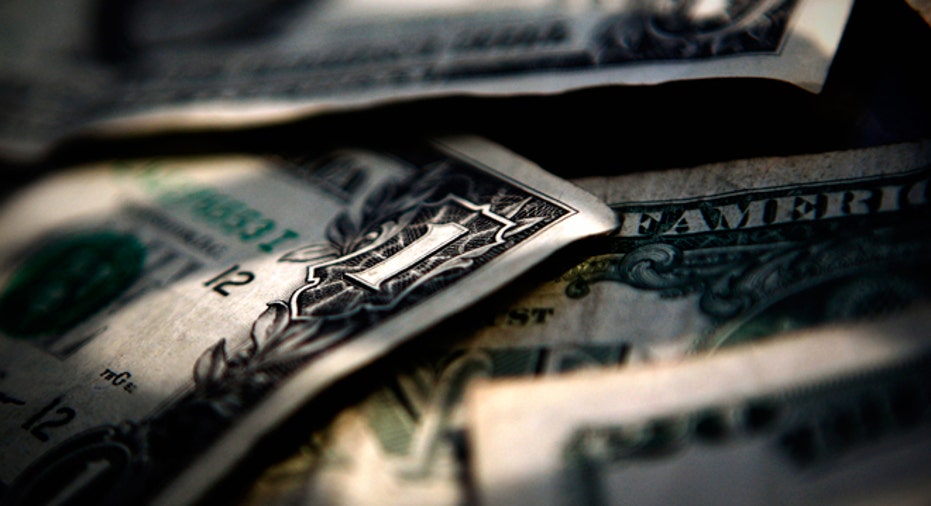Budget Impasse Knocks Dollar to Eight-Month Low

The dollar sagged to an eight-month low on Thursday as the U.S. government shutdown dragged on, though stocks drew comfort from the view that major central banks may have to keep monetary policy super-loose for longer.
Also helping sentiment was an upbeat survey on China's huge services sector, which helped counter a disappointing report on manufacturing earlier in the week.
European shares opened up 0.2 percent, clawing back some of the 0.7 percent they shed on Wednesday. Milan's main stock market .FTMIB, up 0.5 percent, outperformed for a second day after the Italian government survived a confidence vote.
In Asian trading, MSCI's broadest index of Asia-Pacific shares outside Japan .MIAPJ0000PUS swung 1 percent higher, with Taiwan, the Philippines, Indonesia, India and Australia all sporting gains while Japan's Nikkei .N225 ended flat.
A meeting between U.S. President Barack Obama and congressional leaders produced only blame and counter-blame. That dimmed hopes of an early end to the budget impasse, which one U.S. central banker said might lead the Federal Reserve to keep its asset-buying program at current levels for longer.
So far, investors have been betting a budget deal would be reached in time to avoid lasting damage to the economy, although a potentially riskier fight over the U.S. debt ceiling looms.
Philip Marey, a senior U.S. economist at Rabobank, said worries will intensify the nearer Washington gets to the Oct 17 deadline when it will effectively run out of cash - raising prospects of an unprecedented default which the market for now assumes is unthinkable.
"I think we will get a typical risk-off reaction with stocks losing and people fleeing into bonds, particularly U.S. treasuries," Marey said.
"I think at the most 100 basis points (drop in Treasury yields) but more likely 70 or 80 basis points." For stock markets like the benchmark S&P 500. "It could be something like 100 points," he added.
BONDS HOVER
Already one effect has been to further cloud the outlook for when the Fed will start scaling back bond purchases.
Eric Rosengren, head of the Federal Bank of Boston, said on Wednesday that the government shutdown could further delay a tapering because of a lack of official data on the economy.
That only amplified the startling swing in market thinking about the future course of U.S. interest rates. Just a month ago, the futures market had predicted the Fed funds rate would be up around 1.465 percent by the end of 2015. Now it implies a rate of just 0.745 percent.
That in turn has helped drag yields on the benchmark 10-year U.S. Treasury note down to 2.630 percent, from a September peak of 2.99 percent.
Bund yields inched up in early deals. Trading was thinned though by a German public holiday to mark the country's post-cold war reunification. That left focus largely on a Spanish 5- and 10-year bond sale later. <GVD/EUR>
In contrast to the increasingly dovish outlook for U.S. rates, the European Central Bank (ECB) on Wednesday left interest rates unchanged and gave no hint it was considering any imminent further easing. <TOP/CEN>
The dollar's diminishing yield advantage saw it slide to a new eight-month trough against a basket of currencies going as low as 79.740 .DXY before clawing back to last trade at 79.880.
The euro climbed to an eight-month high at $1.3625, bringing in sight the 2013 peak of $1.3711. It edged back slightly to $1.3600 at 3.45 a.m. EDT.
"At face value, the commentary from the ECB sounded rather dovish," said BNP Paribas economist Ken Wattret. "It was apparently not dovish enough, however, with markets continuing to view the ECB's position as one of 'all talk and no action'."
KIWI SHOOTS UP
The dollar did gain some traction on the yen, but only because Japanese investors were selling their currency for euros. Thus while the dollar steadied at 97.70 yen, the euro rose more than half a yen to 132.82.
A notable southern hemisphere mover was the New Zealand dollar, which rallied after country's central bank said larger increases in interest rates would be needed if new limits on mortgage lending failed to cool the country's housing market.
The kiwi jumped to $0.8308, pulling well away from a low of $0.8194 plumbed on Wednesday.
Trading was very choppy in commodity markets, though the lower dollar tended to support prices.
Gold steadied at $1,312 ounce, having bounced from a low of $1,278.24 on Wednesday and Copper futures held their gains to stand at $7,295.50 a metric ton (1.1023 tons).
Oil prices edged off after a jump on Wednesday. Brent crude for November eased 36 cents to $108.82 a barrel, while U.S. crude slipped 56 cents to $103.57.
(Reporting by Marc Jones; Editing by John Stonestreet)



















